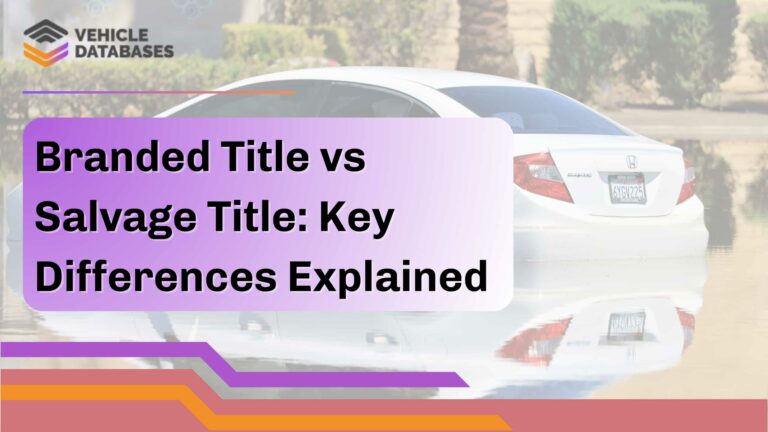Carfax is usually the go-to source for vehicle history reports when buying a used car. Buyers rely on Carfax reports to spot potential issues, while sellers and dealers use it to back up a vehicle’s reliability and value.
But just how accurate is Carfax? Can you trust everything in the report?
In this article, we break down the accuracy, reliability, pros, and cons of Carfax reports to help you make an informed decision.
Who is Carfax?
Carfax is a leading provider of vehicle history reports. It collects data from various sources, including:
- State DMVs
- Auto auctions
- Repair and service shops
- Insurance companies
- Law enforcement agencies, and more.
Carfax has networks of data providers, allowing it to gather as much information as possible on all vehicles. These reports compile information about a vehicle’s history, including ownership transfers, maintenance records, reported accidents, title brand records, and more.
How Accurate is Carfax?
Is Carfax reliable? As mentioned earlier, Carfax gets information from its network of data providers, so it can only show what these providers make available to them. This means that Carfax’s reliability hinges on the data it receives from its sources.
No matter just how well their sources try to get as much information as possible, they cannot get their hands on everything at the end of the day. Here’s why:
- There are gaps in history: Incidents not recorded in their sources may not appear on a Carfax report, potentially creating gaps in the vehicle’s history. This underscores the need for additional research and verification when using Carfax vehicle history reports.
- There’s no verification process: Another critical point to note is that Carfax does not verify the accuracy of reported information, relying on data as it’s provided to them. This means if a dealership or insurance company shares a wrong detail with Carfax, that data will not be verified and will show up on the vehicle’s history report.
Is Carfax Data Realtime?
No, Carfax reports do not show real-time updates. Vehicle data can only be recorded after they’ve been reported or collected from sources. Therefore, a Carfax report may not immediately reflect recent accidents, sales listings, or other similar activities.
For example:
- A recent accident may not show up for days or even weeks.
- A vehicle sale might take time to reflect ownership change.
So, if you’re checking a car’s history today, the report might not show events that happened yesterday.
Pros and Cons of Carfax
While Carfax provides vehicle information as accurately as possible, there are limitations to consider. Take a look at the pros and cons of Carfax reports:
Pros:
- Comprehensive History: Provides detailed vehicle history, including theft records, title brand records, service history, and accident history.
- Transparency: Helps buyers spot potential issues like salvage titles or odometer discrepancies.
- Market Value Estimation: Offers estimated market value, aiding in negotiation and price evaluation.
- Trusted: Widely recognized and trusted in the automotive industry.
- Convenience: Easily accessible online with quick report generation.
Cons:
- Incomplete Reporting: Reports are only as accurate as those reported to Carfax. Minor incidents or repairs that don’t involve insurance claims may not be included. That is, repairs or service records done at home may not be shown on a Carfax report.
- Lack of Confirmation: Carfax does not confirm the accuracy of reported data, which means errors or inaccuracies can occur.
- Missing Context: Sometimes, a Carfax report may not fully detail the severity or context of reported items, such as the severity of accidents, flood damage, etc.
- Expensive: Their reports are on the high side compared with other providers.
It’s also crucial to understand that a Carfax report should not replace a thorough vehicle inspection. Mechanical issues or hidden damages may not be evident from a Carfax report alone.
Used car buyers who make purchases without first verifying the integrity of their vehicles through an inspection often discover an issue after the purchase. You do not want to purchase a piece of junk, so always combine a report with an inspection from a professional mechanic.
Should You Trust a Carfax report?
Yes—and no. Is Carfax legit? Yes, but you can’t know for sure if their reports show everything there is to know about the vehicle.
A Carfax report is only as good as the information reported to it and its source. Note that relying solely on a Carfax report to purchase a used vehicle may lead to inaccurate conclusions and mistakes.
For example, a Mazda Miata owner shared how Carfax missed and misrepresented key vehicle history details. The Carfax report showed inaccurate mileage, missed minor accidents, and a lack of maintenance records from independent shops.
This incomplete information made it difficult to sell the car at a fair price, as buyers doubted its condition.
Detailed Vehicle History offers a complete vehicle history with auction records & images (when available), covering title issues, accidents, sales history, and more at a fraction of the cost. Run a check at 20% off now.
A Better Alternative!
When compared to Carfax, Detailed Vehicle History consistently provides more accurate and detailed data, including accident history, theft records, ownership details, and more. Here’s a comparison of both VIN check services:
Carfax
$44.99
|
❌ Sales listing with photos |
|
❌ Auction records with photos |
|
✔️ Market value data |
|
— Detailed vehicle specifications (Limited) |
|
❌ Window stickers |
|
❌ Support for classic vehicles |
|
✔️ Maintenance recommendation |
|
✔️ Ownership history |
|
✔️ Accident history |
|
✔️ Damage check |
|
✔️ Branded title check |
|
✔️ Salvage title check |
|
❌ Ownership history map |
|
✔️ Recalls |
|
❌ Supports for heavy duty trucks, ATVs, trailers & motorcycles |
|
— Mobile & desktop applications (Limited) |
Detailed Vehicle History
$19.99
|
✔️ Sales listing with photos |
|
✔️ Auction records with photos |
|
✔️ Market value data |
|
✔️ Detailed vehicle specifications |
|
✔️ Window stickers |
|
✔️ Support for classic vehicles |
|
✔️ Maintenance recommendation |
|
✔️ Ownership history |
|
✔️ Accident history |
|
✔️ Damage check |
|
✔️ Branded title check |
|
✔️ Salvage title check |
|
✔️ Ownership history map |
|
✔️ Recalls |
|
✔️ Supports for heavy-duty trucks, ATVs, trailers & motorcycles |
|
✔️ Mobile & desktop applications |
Don’t Rely on Just One Source!!
Want to verify your VIN across multiple databases and not just Carfax? Use Detailed Vehicle History’s trusted VIN lookup tool to get a full picture of any vehicle’s past, including accident records, ownership history, open recalls, and more; all in one easy report.
Can dealerships gain access to Carfax vehicle data?
Yes, businesses can access Carfax-like vehicle data through Vehicle Databases APIs. We offer vehicle data APIs designed for the US, UK, and Canadian automotive businesses.
This API enables companies to generate their comprehensive vehicle history reports for consumers. Unlike Carfax, which keeps its data private, our Carfax API alternative gives businesses access to a reliable database, helping you scale faster.
This solution is perfect for:
- Dealerships
- Auto repair shops
- Online vehicle marketplaces
- Car insurance companies
- And more
Whether buying, selling, repairing, or insuring vehicles, our API empowers businesses to efficiently deliver detailed and accurate car history information to their customers. Don’t wait for Carfax reports.
Get full access to a database of over 65 million vehicle records with our Carfax API alternative.
Frequently Asked Questions
Can Carfax be wrong?
Yes, Carfax can be wrong. Carfax can only pass on the information they have gathered from different sources; hence, it can only provide information that has been passed on to it.
Carfax vehicle history reports may contain some errors or missing information if the data is not reported in the first place or if the source supplies wrong information.
Is Carfax value accurate?
Carfax reports are generally accurate, depending on the amount of information available in their database. This is why it’s a good idea to get reports from multiple sources to get the full picture.
How accurate is Carfax value?
Generally, the Carfax value estimates are a good predictor of a car’s market price considering its past, and current condition among other aspects. These estimates should, however, not be viewed as a definitive number but as a range.
The actual market price of a vehicle may be influenced by other factors; the market conditions, the region, and other factors outside the contents of the report.
How accurate is Carfax mileage?
Carfax mileage accuracy depends on the data reported to it. Typically, mileage is recorded during services, inspections, and title transfers. However, mileage discrepancies can occur if there are unreported instances or errors in the data provided.
Verifying mileage through multiple sources and a physical inspection when possible is always a good idea.
Is a carfax report reliable?
Yes, Carfax reports are reliable. Just make sure to carry out a proper mechanical inspection before making any decisions in the used car market.
How much does a carfax report cost?
Currently, a single Carfax report costs $44.99.




